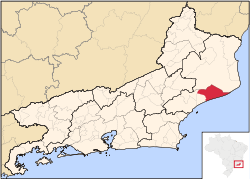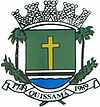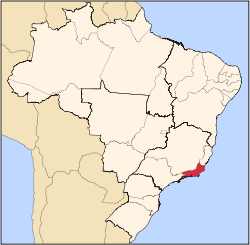Quissamã
From Wikipedia, the free encyclopedia
Coordinates: 22°06′25″S 41°28′19″W / 22.10694°S 41.47194°W
| Quissamã | |||
|---|---|---|---|
 | |||
| |||
 | |||
| Coordinates: 22°06′25″S 41°28′19″W / 22.10694°S 41.47194°W | |||
| Country | Brazil | ||
| Region | Southeast | ||
| State | Rio de Janeiro | ||
| Colonization started | 1633 | ||
| Settled as Freguesia | 1755 | ||
| Municipality Established | January 4, 1989 | ||
| Government | |||
| • Mayor | Armando Cunha Carneiro da Silva (until 2008) | ||
| Area | |||
| • Total | 715.877 km2 (276.402 sq mi) | ||
| Elevation | 20 m (70 ft) | ||
| Population (2006) | |||
| • Total | 17,376 | ||
| • Density | 24.3/km2 (63/sq mi) | ||
| Time zone | UTC-3 (UTC-3) | ||
| • Summer (DST) | UTC-2 (UTC-2) | ||
| Website | www.quissama.rj.gov.br | ||
Quissamã (Portuguese pronunciation: [ˌkiˈsamɜ̃]) is a municipality located in the Brazilian state of Rio de Janeiro. It sits on Atlantic coastline with the two largest neighboring cities being Campos das Goytacazes to the north and Macaé to the south. Quissamã was part of the municipality of Macaé until the city emancipated in 1989. The population has surpassed 20,000 inhabitants as of the 2010 Census.[1] The city's primary source of tax revenue comes from oil royalties collected from drilling in the waters just off its coast.
References
| ||||||||||||||||||||||||||||||||||||||||||||||||||||||||||||||||||||||||||
This article is issued from Wikipedia. The text is available under the Creative Commons Attribution/Share Alike; additional terms may apply for the media files.


